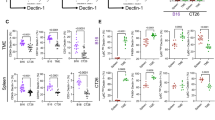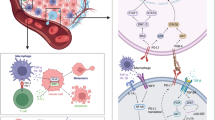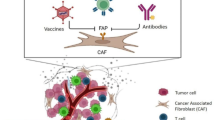Abstract
Purpose
The Fas-antigen is a cell surface receptor that transduces apoptotic signals into cells. The purpose of this study was to evaluate FasL expression in breast cancer and to elucidate the role of its signaling in different breast cancer cell lines.
Methods
T47D and MCF7 cells were used and cultured in Dulbecco’s modified Eagle’s medium. FasL translocation to the membrane was achieved by culturing the cells in the presence of human interferon-γ (IFNγ). Translocation was detected by immunofluorescence. The ability of a Fas:Fc fusion protein to trigger apoptosis in these cells was investigated by cell death detection ELISA. After incubation with IFNγ for 4 h and 18 h, apoptosis was assessed in response to treatment with Fas:Fc.
Results
Immunofluorescence revealed that the used cell lines were positive for FasL which was increased and changed to more membrane-bound FasL expression after IFNγ stimulation. After stimulation with 50 IU/ml IFNγ, Fas:Fc significantly increased MCF7 apoptosis (1.39 ± 0.06-fold, p = 0.0004) after 18 h. After stimulation with 100 IU/ml, Fas:Fc significantly increased apoptosis both after 4 h (1.49 ± 0.15-fold, p = 0.018) and 18 h (1.30 ± 0.06-fold, p = 0.013). In T47D cells this effect was seen after 4 h of stimulation with 50 IU/ml and addition of Fas:Fc (1.6 ± 0.08-fold, p = 0.03).
Conclusion
Membrane-bound FasL expression could be induced by IFNγ in a breast cancer cell model. More importantly, in the presence of IFNγ the Fas:Fc fusion protein was able to transmit pro-apoptotic signals to T47D and MCF7 cells, significantly inducing apoptosis. The current findings support further in vivo studies regarding FasL activation as a potential target for therapeutic intervention in breast cancer.




Similar content being viewed by others
References
AshkenaziA, DixitVM (1998) Death receptors: signaling and modulation. Science281:1305–1308
BlokEJ, van denBulkJ, Dekker-EnsinkNG, DerrR, KantersC, BastiaannetE, KroepJR, van deVeldeCJ, KuppenPJ (2017) Combined evaluation of the FAS cell surface death receptor and CD8 + tumor infiltrating lymphocytes as a prognostic biomarker in breast cancer. Oncotarget8:15610–15620. https://doi.org/10.18632/oncotarget.14779
ChenL, ParkSM, TumanovAV, HauA, SawadaK, FeigC, TurnerJR, FuYX, RomeroIL, LengyelE, PeterME (2010) CD95 promotes tumour growth. Nature465:492–496. https://doi.org/10.1038/nature09075
ChengJ, ZhouT, LiuC, ShapiroJP, BrauerMJ, KieferMC, BarrPJ, MountzJD (1994) Protection from Fas-mediated apoptosis by a soluble form of the Fas molecule. Science263:1759–1762
ConnollyK, ChoYH, DuanR, FikesJ, GregorioT, LaFleurDW, OkoyeZ, SalcedoTW, SantiagoG, UllrichS, WeiP, WindleK, WongE, YaoXT, ZhangYQ, ZhengG, MoorePA (2001) In vivo inhibition of Fas ligand-mediated killing by TR6, a Fas ligand decoy receptor. J Pharmacol Exp Ther298:25–33
DesbaratsJ, DukeRC, NewellMK (1998) Newly discovered role for Fas ligand in the cell-cycle arrest of CD4+ T cells. Nat Med4:1377–1382. https://doi.org/10.1038/3965
FischerI, JeschkeU, FrieseK, DaherS, BetzAG (2011) The role of galectin-1 in trophoblast differentiation and signal transduction. J Reprod Immunol90:35–40. https://doi.org/10.1016/j.jri.2011.04.004
GmeinerWH, Jennings-GeeJ, StuartCH, PardeeTS (2015) Thymineless death in F10-treated AML cells occurs via lipid raft depletion and Fas/FasL co-localization in the plasma membrane with activation of the extrinsic apoptotic pathway. Leuk Res39:229–235. https://doi.org/10.1016/j.leukres.2014.11.006
GriffithTS, BrunnerT, FletcherSM, GreenDR, FergusonTA (1995) Fas ligand-induced apoptosis as a mechanism of immune privilege. Science270:1189–1192
HerrnringC, ReimerT, JeschkeU, MakovitzkyJ, KrugerK, GerberB, KabelitzD, FrieseK (2000) Expression of the apoptosis-inducing ligands FasL and TRAIL in malignant and benign human breast tumors. Histochem Cell Biol113:189–194
IgneyFH, KrammerPH (2005) Tumor counterattack: fact or fiction?Cancer Immunol Immunother54:1127–1136. https://doi.org/10.1007/s00262-005-0680-7
ItohN, YoneharaS, IshiiA, YoneharaM, MizushimaS, SameshimaM, HaseA, SetoY, NagataS (1991) The polypeptide encoded by the cDNA for human cell surface antigen Fas can mediate apoptosis. Cell66:233–243
KeaneMM, EttenbergSA, LowreyGA, RussellEK, LipkowitzS (1996) Fas expression and function in normal and malignant breast cell lines. Cancer Res56:4791–4798
KhongHT, RestifoNP (2002) Natural selection of tumor variants in the generation of “tumor escape” phenotypes. Nat Immunol3:999–1005. https://doi.org/10.1038/ni1102-999
LeGalloM, PoissonnierA, BlancoP, LegembreP (2017) CD95/Fas, non-apoptotic signaling pathways, and kinases. Frontiers Immunol8:1216. https://doi.org/10.3389/fimmu.2017.01216
LettauM, PaulsenM, SchmidtH, JanssenO (2011) Insights into the molecular regulation of FasL (CD178) biology. Eur J Cell Biol90:456–466. https://doi.org/10.1016/j.ejcb.2010.10.006
LiuQ, TanQ, ZhengY, ChenK, QianC, LiN, WangQ, CaoX (2014) Blockade of Fas signaling in breast cancer cells suppresses tumor growth and metastasis via disruption of Fas signaling-initiated cancer-related inflammation. J Biol Chem289:11522–11535. https://doi.org/10.1074/jbc.M113.525014
LuckerathK, KirkinV, MelzerIM, ThalheimerFB, SieleD, MilaniW, AdlerT, Aguilar-PimentelA, HorschM, MichelG, BeckersJ, BuschDH, OllertM, Gailus-DurnerV, FuchsH, Hrabe de AngelisM, StaalFJ, RajalingamK, HueberAO, StroblLJ, Zimber-StroblU, ZornigM (2011) Immune modulation by Fas ligand reverse signaling: lymphocyte proliferation is attenuated by the intracellular Fas ligand domain. Blood117:519–529. https://doi.org/10.1182/blood-2010-07-292722
MakrigiannakisA, ZoumakisE, KalantaridouS, CoutifarisC, MargiorisAN, CoukosG, RiceKC, GravanisA, ChrousosGP (2001) Corticotropin-releasing hormone promotes blastocyst implantation and early maternal tolerance. Nat Immunol2:1018–1024. https://doi.org/10.1038/ni719
MinasV, JeschkeU, KalantaridouSN, RichterDU, ReimerT, MylonasI, FrieseK, MakrigiannakisA (2007) Abortion is associated with increased expression of FasL in decidual leukocytes and apoptosis of extravillous trophoblasts: a role for CRH and urocortin. Mol Hum Reprod13:663–673. https://doi.org/10.1093/molehr/gam054
MorG, KohenF, Garcia-VelascoJ, NilsenJ, BrownW, SongJ, NaftolinF (2000) Regulation of fas ligand expression in breast cancer cells by estrogen: functional differences between estradiol and tamoxifen. J Steroid Biochem Mol Biol73:185–194
MottoleseM, BuglioniS, BracalentiC, CardarelliMA, CiaboccoL, GiannarelliD, BottiC, NataliPG, ConcettiA, VenanziFM (2000) Prognostic relevance of altered Fas (CD95)-system in human breast cancer. Int J Cancer89:127–132
MullauerL, MosbergerI, GruschM, RudasM, ChottA (2000) Fas ligand is expressed in normal breast epithelial cells and is frequently up-regulated in breast cancer.J Pathol190:20–30. https://doi.org/10.1002/(sici)1096-9896(200001)190:1<20::aid-path497>3.0.co;2-s
MuschenM, MoersC, WarskulatU, NiederacherD, BetzB, EvenJ, LimA, JosienR, BeckmannMW, HaussingerD (1999) CD95 ligand expression in dedifferentiated breast cancer. J Pathol189:378–386. https://doi.org/10.1002/(sici)1096-9896(199911)189:3<378::aid-path439>3.0.co;2-d
PeterME, BuddRC, DesbaratsJ, HedrickSM, HueberAO, NewellMK, OwenLB, PopeRM, TschoppJ, WajantH, WallachD, WiltroutRH, ZornigM, LynchDH (2007) The CD95 receptor: apoptosis revisited. Cell129:447–450. https://doi.org/10.1016/j.cell.2007.04.031
PetsasG, JeschkeU, RichterDU, MinasV, HammerA, KalantaridouS, TothB, TsatsanisC, FrieseK, MakrigiannakisA (2012) Aberrant expression of corticotropin-releasing hormone in pre-eclampsia induces expression of FasL in maternal macrophages and extravillous trophoblast apoptosis. Mol Hum Reprod18:535–545. https://doi.org/10.1093/molehr/gas027
ReillyO, TaiLA, LeeL, KruseL, GrabowEA, FairlieS, HaynesWD, TarlintonNM, ZhangDM, BelzJG, SmythGT, BouilletMJ, RobbP, StrasserL A (2009) Membrane-bound Fas ligand only is essential for Fas-induced apoptosis. Nature461:659–663. https://doi.org/10.1038/nature08402
ReimerT, HerrnringC, KoczanD, RichterD, GerberB, KabelitzD, FrieseK, ThiesenHJ (2000) FasL:Fas ratio–a prognostic factor in breast carcinomas. Cancer Res60:822–828
ReimerT, KoczanD, MullerH, FrieseK, ThiesenHJ, GerberB (2002) Tumour Fas ligand:Fas ratio greater than 1 is an independent marker of relative resistance to tamoxifen therapy in hormone receptor positive breast cancer. Breast Cancer Res4:R9
Sheen-ChenSM, ChenHS, EngHL, ChenWJ (2003) Circulating soluble Fas in patients with breast cancer. World J Surg27:10–13. https://doi.org/10.1007/s00268-002-6378-5
SmithCA, FarrahT, GoodwinRG (1994) The TNF receptor superfamily of cellular and viral proteins: activation, costimulation, and death. Cell76:959–962
SongRX, MorG, NaftolinF, McPhersonRA, SongJ, ZhangZ, YueW, WangJ, SantenRJ (2001) Effect of long-term estrogen deprivation on apoptotic responses of breast cancer cells to 17beta-estradiol. J Natl Cancer Inst93:1714–1723
StrasserA, JostPJ, NagataS (2009) The many roles of FAS receptor signaling in the immune system. Immunity30:180–192. https://doi.org/10.1016/j.immuni.2009.01.001
SudaT, TakahashiT, GolsteinP, NagataS (1993) Molecular cloning and expression of the Fas ligand, a novel member of the tumor necrosis factor family. Cell75:1169–1178
SunM, FinkPJ (2007) A new class of reverse signaling costimulators belongs to the TNF family. J Immunol179:4307–4312
SunM, AmesKT, SuzukiI, FinkPJ (2006) The cytoplasmic domain of Fas ligand costimulates TCR signals. J Immunol177:1481–1491
SuzukiI, FinkPJ (1998) Maximal proliferation of cytotoxic T lymphocytes requires reverse signaling through Fas ligand. J Exp Med187:123–128
TakahamaY, YamadaY, EmotoK, FujimotoH, TakayamaT, UenoM, UchidaH, HiraoS, MizunoT, NakajimaY (2002) The prognostic significance of overexpression of the decoy receptor for Fas ligand (DcR3) in patients with gastric carcinomas. Gastric Cancer5:61–68. https://doi.org/10.1007/s101200200011
TakahashiT, TanakaM, InazawaJ, AbeT, SudaT, NagataS (1994) Human Fas ligand: gene structure, chromosomal location and species specificity. Int Immunol6:1567–1574
UenoT, ToiM, TominagaT (1999) Circulating soluble Fas concentration in breast cancer patients. Clin Cancer Res5:3529–3533
WalczakH, KrammerPH (2000) The CD95 (APO-1/Fas) and the TRAIL (APO-2L) apoptosis systems. Exp Cell Res256:58–66. https://doi.org/10.1006/excr.2000.4840
WenzelJ, SanzenbacherR, GhadimiM, LewitzkyM, ZhouQ, KaplanDR, KabelitzD, FellerSM, JanssenO (2001) Multiple interactions of the cytosolic polyproline region of the CD95 ligand: hints for the reverse signal transduction capacity of a death factor. FEBS Lett509:255–262
WuGZ, PanCX, JiangD, ZhangQ, LiY, ZhengSY (2015) Clinicopathological significance of Fas and Fas ligand expressions in esophageal cancer. Am J Cancer Res5:2865–2871
XiaHL, LiCJ, HouXF, ZhangH, WuZH, WangJ (2017) Interferon-gamma affects leukemia cell apoptosis through regulating Fas/FasL signaling pathway. Eur Rev Med Pharmacol Sci21:2244–2248
Acknowledgements
We thank D.U. Richter and S. Neumann for their excellent technical assistance. K. Krueger carried out preliminary experimental work.
Author information
Authors and Affiliations
Corresponding author
Ethics declarations
Funding
No funding was obtained.
Conflict of interest
Prof. Sven Mahner has received research support, advisory board fees, honoraria, and travel support from AstraZeneca, Bayer, Boehringer Ingelheim, Jenapharm, GSK, JanssenCilag, Medac, MSD, Pharmamar, Roche, Tesaro, and Teva. All other authors declare no conflict of interest.
Ethical approval
This article does not contain any studies with human participants or animals performed by any of the authors.
Rights and permissions
About this article
Cite this article
Kolben, T., Jeschke, U., Reimer, T. et al. Induction of apoptosis in breast cancer cells in vitro by Fas ligand reverse signaling. J Cancer Res Clin Oncol 144, 249–256 (2018). https://doi.org/10.1007/s00432-017-2551-y
Received:
Accepted:
Published:
Issue Date:
DOI: https://doi.org/10.1007/s00432-017-2551-y




